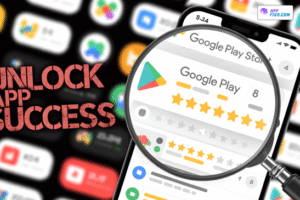Introduction: Google Play ratings
Understanding Google Play ratings is crucial for any developer or marketer seeking to succeed in today’s competitive mobile landscape. Ratings are not just simple numbers; they serve as public proof of quality and trust. When users search for apps, the star ratings system. Immediately influences their decision to install or ignore your product.
In fact, a high average rating can directly improve your app install conversion rate by showing potential users that others enjoy the experience. On the other hand, ignoring user feedback can quickly damage your visibility and overall success.
Effective app reviews management ensures that both positive and negative feedback is addressed, strengthening your connection with the audience. With the right app marketing strategy, developers can boost credibility, improve keyword rankings, and even increase the chances of being listed as featured apps in app stores.
What Are App Ratings and Reviews in App Stores?
An app rating is a quick score that users assign, typically using a star rating system. Five stars show high satisfaction, while one star indicates major problems. A review is written feedback that provides more details about the user experience (UX).
Both ratings and reviews are public. For example, in Play Store reviews, the star count is visible in search results, recommended apps, and categories. In the iOS App Store feedback section, reviews appear directly on the product page. This means your app’s reputation is always on display for potential users.
Start with an App Rating and Review Strategy
Every app needs a strong app feedback strategy. A clear plan helps you encourage happy users to share positive feedback and guides you in handling negative reviews. If you do not reply to unhappy users, they may keep their low ratings, and that can destroy your app’s reputation management.
Your strategy should define how you will ask for reviews, where the prompts will appear, and how often. Well-designed app prompt design can gently remind users to leave feedback at the right time. A good prompt appears after a smooth user experience, not during errors or issues.
Why Are App Ratings and Reviews Important to ASO?
Ratings and reviews directly affect organic keyword rankings. Google indexes descriptive words from reviews, so the “Do keywords in Google Play reviews improve ranking?” question has a clear answer: yes, they do. In contrast, Apple does not index review keywords, but ratings still influence rankings and installs.
The “What is the impact of app reviews on conversion rate?” is huge. When a user sees two similar apps, the one with more positive feedback will likely get more downloads. Ratings are a trust signal. More reviews also mean a larger customer feedback loop, which helps improve product quality.
Differences Between Google Play and Apple App Store
There is a clear “Difference between Google Play ratings and App Store ratings.” Google Play weighs recent ratings more heavily, rewarding improvement. Apple, however, calculates averages based on the lifetime of ratings, although developers can choose “Resetting app ratings in iOS App Store.”
Google indexes reviews, meaning “App review analysis for competitive research” can uncover hidden keyword opportunities. On the other hand, Apple provides less visibility in search but highlights selected reviews on the product page, which influences conversion differently
Google Play Ratings and Reviews
In Google Play, ratings are everywhere. From search results to category charts, users can quickly compare apps by scores. Apps with at least 4.0 stars are more likely to become featured apps in app stores. This visibility drives more installs.
Play Store reviews also show the most positive and the most critical reviews. There’s no way to hide a negative one, so “How to reply to negative app reviews professionally” is key. A smart developer’s response to reviews can turn a frustrated user into a loyal fan.
Apple App Store Ratings and Reviews
The App Store highlights fewer results in search but puts more emphasis on screenshots. Ratings still appear, and iOS App Store feedback plays a critical role in user trust. However, Apple also highlights about six reviews, which could be old or recent.
For developers, this makes “How to get featured in app stores through ratings” a combination of ratings, screenshots, and store optimization. Replying to reviews shows potential users that developers care, building long-term brand trust in app stores.
Improving App Ratings and Reviews
The “Best way to get positive app reviews on Google Play” is to ask users at the right time and provide a smooth experience. High-quality UX reduces frustration and increases good reviews. Incentives, gamification, and gentle nudges can also help.
The “How to improve average app star rating quickly” involves a mix of replying to complaints, fixing bugs fast, and using review analysis tools. Tracking feedback helps you solve the biggest pain points. A customer feedback loop ensures continuous improvement.
Replying to User Reviews in App Stores
“Can developers remove bad app reviews?” is a common question. The answer is no, but developers can report inappropriate reviews. Otherwise, the best approach is negative review handling through direct replies.
A polite and personal developer response to reviews shows responsibility. If a user complained about a bug and you fixed it, explain the solution. Many times, this leads the user to update their rating, proving the power of app reputation management.
Keep Analyzing Reviews to Understand Your Market
Regular app competitive analysis helps you stay ahead. By using AI-powered review summaries, you can discover trends faster. For example, if users love a competitor’s design but complain about slow speed, you can improve in those areas.
Case studies show that apps that monitor reviews weekly improve retention by up to 25%. The insights from “App review analysis for competitive research” make this possible. The key is to always close the loop with the customer feedback loop process.
Conslousion
Google Play ratings and reviews are not just numbers. They represent how real users view your app. Without proper app reviews management, you risk losing visibility and installs. The “Why are app store reviews important for downloads?” is simple: users always compare.
By applying the right app marketing strategy, monitoring with review analysis tools, and engaging in developer response to reviews, your app will grow faster. Remember, “How do app ratings affect ASO rankings?” is answered every day by the apps that dominate the top charts — they listen, reply, and improve continuously.



